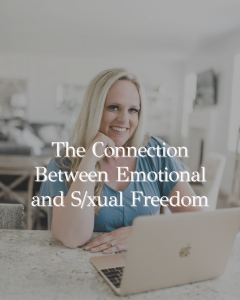
Have you ever thought about what drives your sexual desire? One key factor is the freedom we feel in our lives. Freedom plays a vital role in fostering vibrant sexuality and intimacy, and without it, we may experience disconnection, frustration, or stagnation. In this episode, we’ll explore the powerful link between freedom and sex, why it’s so crucial, and how you can create more freedom in both your personal life and sexual relationships.
Show Summary:
When we think about what drives our sexual desire, one key factor stands out: the freedom we feel in our lives. Freedom is a cornerstone of vibrant sexuality and intimacy, and its absence can lead to feelings of disconnection, frustration, or stagnation. Today, we’re exploring the connection between freedom and sex, why it’s so essential, and how you can cultivate more freedom in your life and your sexual relationship.
What is Freedom?
Freedom is the ability to act, think, and express yourself without undue restriction. It’s about autonomy and the power to make choices that align with your values and desires. Imagine waking up in the morning and knowing you have the time to engage in activities that matter most to you, without feeling rushed or overwhelmed by others’ expectations. For some, freedom might mean taking a leisurely walk alone; for others, it could mean having the ability to say no to obligations that drain their energy. Freedom can be physical, emotional, mental, or relational, but at its core, it is about creating space to be yourself.
Physical Freedom
Physical freedom means feeling comfortable and unrestricted in your body. This might involve prioritizing your health by eating nourishing foods, engaging in physical activities that bring joy, and treating your body with kindness. For example, someone might experience physical freedom by taking up a dance class that allows them to move freely and feel alive in their body. It also includes addressing any physical pain or discomfort that might limit your ability to fully engage in life or sex. When you embrace your physical self without judgment, you open the door to greater confidence and connection with your partner.
Emotional Freedom
Emotional freedom is about being able to feel and express your emotions without fear of criticism or rejection. It’s giving yourself permission to be vulnerable and authentic, even in difficult moments. Imagine a scenario where you feel overwhelmed and share those feelings with your partner, knowing they will respond with empathy rather than judgment. Emotional freedom might also mean letting go of past hurts or grudges, allowing yourself to heal and fully engage in your relationship. For instance, a couple who practices emotional freedom might schedule regular check-ins to openly discuss their feelings, creating a deeper emotional bond.
Mental Freedom
Mental freedom focuses on clarity and the ability to think for yourself, free from the weight of societal or internalized expectations. This might involve challenging long-held beliefs that no longer serve you. For example, someone raised with the idea that expressing sexual desire is shameful might work to reframe those thoughts and embrace their sexuality as a healthy part of life. Mental freedom can also mean finding ways to quiet the mental chatter that often distracts from sex, such as practicing mindfulness or engaging in coaching or therapy to address negative thought patterns.
Relational Freedom
Relational freedom is about creating healthy boundaries and fostering relationships where mutual respect and understanding allow both partners to thrive. This might look like a couple agreeing on how to divide household responsibilities to avoid resentment or one partner supporting the other in pursuing their individual passions. For example, if one partner loves painting, giving them the time and space to focus on their art can strengthen the relationship. Relational freedom also involves open and honest communication, ensuring that both partners feel heard and valued.
Sexual Freedom
Sexual freedom builds on this foundation. It’s the ability to express your sexual self authentically, without shame, guilt, or coercion. Think about a time when you felt completely comfortable in your own skin—perhaps you were dancing, laughing, or simply lying in bed. Sexual freedom is similar. It means feeling comfortable in your body, free to communicate your desires and boundaries, and safe to explore your sexuality within the context of your values and relationships. For instance, a couple might decide to explore new forms of sex and intimacy together, knowing that they can share their thoughts without fear of judgment. Sexual freedom is not about doing whatever you want without regard for others; it’s about cultivating mutual respect, trust, and honesty in your sexual relationship.
Why Freedom Matters
Sexuality thrives in an environment of freedom. When you feel trapped, controlled, or judged, desire often diminishes. Imagine being told you can only express yourself in certain ways or that your desires are inherently wrong. It’s suffocating, isn’t it? Freedom allows authenticity, which means showing up as your true self in the bedroom. For example, a woman who feels free to express her emotions and needs may be more open to initiating sex, deepening her connection with her partner. Freedom also fosters curiosity and playfulness. A couple who feels free might decide to experiment with a new form of touch or role-play, finding joy and excitement in their exploration. Emotional safety—the foundation of freedom—reduces anxiety and fear, both of which are major blockers to desire. Without freedom, sexuality can feel like an obligation or chore rather than an opportunity for connection and pleasure.
What Restricts Freedom?
Many factors can make you feel trapped or restricted in life and in your sexual relationship. Societal expectations, for example, often impose strict rules about what is “acceptable” sexually. A person raised with messages that sex is dirty or sinful might struggle to embrace their desires. Similarly, unspoken rules within a relationship can create a stifling atmosphere. Imagine a partner who expects sex on a rigid schedule without considering their spouse’s needs. Emotional baggage, such as unresolved conflicts or past traumas, can weigh you down, leaving little room for intimacy. And then there’s the stress and overwhelm of daily life. When your schedule is packed with work, parenting, and other responsibilities, it’s easy to lose sight of your own needs.
Cultivating Freedom
To cultivate freedom, start by identifying what freedom looks like for you. Ask yourself: What does it mean to feel free in my life and relationship? For example, freedom might mean taking time each week for self-care, whether that’s a yoga class, a creative hobby, or simply sitting quietly with a book. It might also mean reexamining the stories you’ve been told about sex and relationships. Are they serving you, or are they holding you back? For instance, if you believe that being a “good spouse” means always saying yes to sex, consider how that belief might be limiting your authenticity. Practicing self-compassion is another way to create freedom. When you give yourself permission to grow, change, and make mistakes, you reduce self-imposed pressure and open the door to greater emotional freedom. Finally, create space for desire by intentionally building moments of relaxation and connection into your day. Freedom often requires time and space to breathe.
Fostering Freedom in Your Relationship
Fostering freedom with your partner involves open communication. Imagine a couple sitting down to discuss their needs and boundaries, each feeling safe to share without fear of criticism. This kind of dialogue creates an environment where both partners feel valued and heard. Encouraging autonomy is also important. When you support your partner in pursuing their interests and passions, you build a sense of freedom within the relationship. For example, if your spouse loves running, giving them the time and space to pursue that can strengthen your connection. Curiosity—approaching your partner’s needs and desires with an open mind—is another key. A wife who listens with curiosity rather than judgment when her husband shares a fantasy creates a space for honesty and trust. Finally, collaborating on new experiences together can reignite passion. A couple who decides to explore a new hobby or travel to a new destination might find that these shared adventures deepen their intimacy.
What Freedom Looks Like
Freedom looks different for everyone. For one person, it might mean letting go of perfectionism and embracing spontaneity. For another, it might mean setting boundaries with extended family to prioritize their marriage. Freedom often feels like lightness and empowerment, like being able to breathe deeply and move through life with ease. Imagine how this might transform your sexual relationship. A woman who feels free might approach sex and intimacy with excitement rather than obligation, while a man who feels free might find himself more willing to explore his partner’s needs. Freedom enhances sexual confidence, deepens connection, and sparks creativity.
What Would Freedom Do for You?
If you felt free, what would that do for you sexually? Perhaps it would make you more adventurous, more willing to initiate, or more open to discussing your fantasies with your partner. Freedom might also make sex and intimacy feel like a choice, something you actively want rather than something you do out of duty. Ask yourself: How would you like to create more freedom in your life? Are there small changes you can make today, like saying no to obligations that drain your energy or scheduling time for relaxation? Are there conversations you need to have with your partner about feeling restricted? How can you prioritize your emotional, mental, and physical well-being?
Freedom is not about perfection; it’s about creating the space to grow, explore, and connect. When you and your partner embrace freedom—both individually and together—your sexual relationship can become a powerful source of joy, intimacy, and connection. So, what does freedom mean to you, and how will you start building it into your life today?
Remember, love is a journey, not a destination. Stay committed, stay passionate, and stay connected. Goodbye for now.



